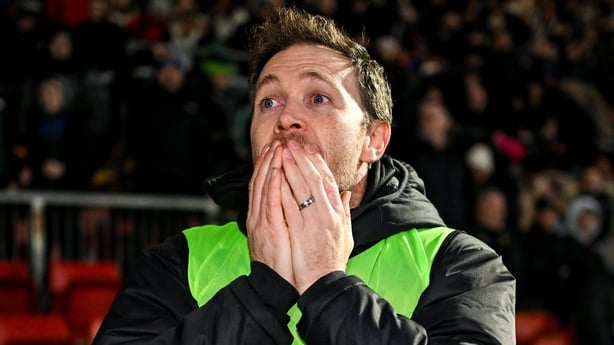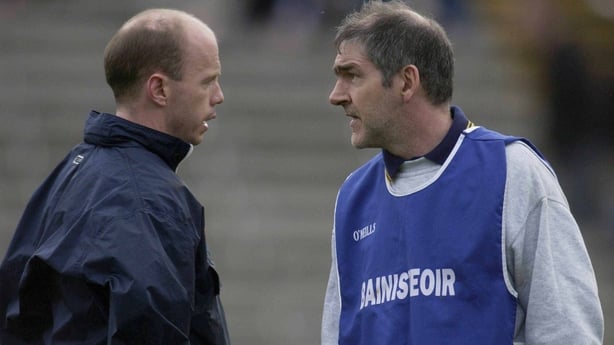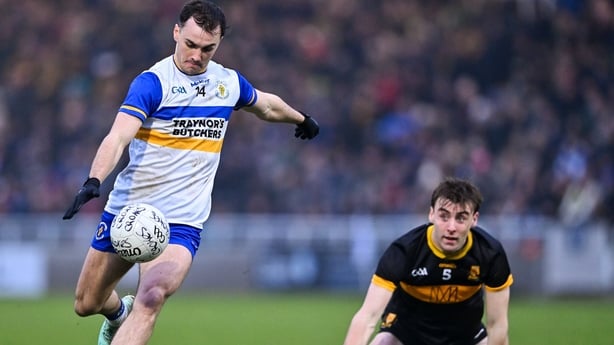Errigal Ciarán go where no Tyrone club has gone before this weekend.
The All-Ireland club championship throws up many curiosities and this might be the most curious of all.
How have Tyrone, the most consistently successful Ulster county since colour televisions came along, made such a minimal impression at the business end of the club championship?
In 1993, Errigal Ciarán became the first Tyrone team to win the Ulster club title and, bizarrely, they remain the only one to have done so.
By extreme contrast, Tyrone's northern neighbours and bitter rivals Derry, considerably less successful in the county grade over the last four decades, is home to four All-Ireland club champions and a whopping eight different Ulster club title winners.
The highly democratic nature of the Tyrone SFC, with no back-to-back winner since Carrickmore in 2004-05 and nine different champions in the meantime, has often been advanced as a factor.
"I think it's that thing where it's difficult to get much provincial experience built up under a team's belt because the champions tend to change each year," Errigal Ciarán manager Enda McGinley told RTÉ Sport ahead of training earlier this week.
"That definitely is part of the picture. And then you're obviously coming through a particularly tough province, where there's been really, really strong teams over the years as well. Multiple different clubs (from Ulster) winning All-Ireland club titles.
"That means you're coming out of one shark-infested water and into another shark-infested water. It's a long way to survive to get to the All-Ireland series.
"Maybe it's just one of those statistical oddities. I would be very confident in the years to come that the stats will change around that."
This is certainly underlined by their run to the final, which McGinley reckons has increased his cardiac age by several years.
Before surviving extra-time against Crokes in last week's classic, they had won four matches by a single point, including both county and provincial finals, and were previously taken to a replay in the Tyrone quarter-final.
"There's advantages to that in that it builds up experience and - not a comfort - but certainly a composure coming down the straight," says McGinley. "A feeling of we have been here before. The fear is that you've used up whatever bit of luck and whatever bit of good grace is out there.

"But I have to hand it to the players. Whenever it's at that stage of the game, the management stuff is out the window. The players are playing as they see the game at that moment. It's down to them having the courage to go and do things in those moments and we thankfully have plenty of that in the team."
The long war
Eight years before the Good Friday Agreement, a peace deal almost as monumental was agreed in south Tyrone.
The Errigal Ciarán club traces its modern history, under its new name, back to 1990. This followed a well documented eight-year split, which had a certain future Tyrone manager at its heart. Mickey Harte himself detailed the background in RTÉ's 'Pride of the Parish' documentary back in 2008, filmed during the course of Tyrone's run to their third All-Ireland.
A brief history for the unaware. The area itself is made up of four townlands, which has - or had, at least - four feeder primary schools, these being Ballygawley, Glencull, Garvaghy and Altamuskin. They had competed under the name of Ballygawley St Ciaran's from the early 20th century, winning a couple of county titles in 1926 and 1931.
It was a parish league game between Harte's Glencull and Ballygawley in 1982 where the trouble started. Harte, then a 28-year old player-manager, was involved in a fracas with an opposition player with both sent off. The dispute properly arose when the club proposed Harte for a suspension but not his sparring partner.
The irate Glencull contingent withdrew from the club altogether, precipitating a stand-off which would last for the rest of the decade. After their objections had failed, they formed their own club, St Malachy's, Glencull.
The rebel entity were repeatedly denied affiliation for the next eight years but continued to train and prepare and fundraise the same as any other team. They could not, however, partake in any official matches, their players confined to ad-hoc challenge games and invitational nine-a-side blitzes.
"Some people would suggest that we in our area were a bit stubborn about the whole thing," conceded a smiling Harte on 'Pride of the Parish. "We like to think we were a bit creative as well!"
It was into this strange alternate dimension of St Malachy's GAA that a once-in-a-generation talent emerged. Advocates of the Go Games principle of restricting competitive games for youngsters may be emboldened to learn that Peter Canavan spent the bulk of his teens subsisting mainly on a diet of challenge matches.
1980s home video footage proliferates of a tiny Canavan jinking and side-stepping defenders and burying goals on the uneven playing field in Glencull, with Harte on commentary duty. In shades of Seanie Johnston, Canavan had to register with the Killyclogher hurlers to feature in Tyrone's 1988 Ulster minor winning team.
Canavan's obvious talent - about which word had naturally spread - has been cited as one of the chief factors in the eventual rapprochement. The remaining constituent parts of Ballygawley had reached a first county final in 58 years in 1989, losing to Coalisland. With silverware tantalisingly close, the hard-headed folk in Ballygawley and elsewhere decided they needed the Glencull boys - and Canavan - back on board. George Mitchell wasn't sent for but the warring parties made peace in 1990, rebranding as Errigal Ciarán.

While the split may have been seemed maddeningly self-defeating at the time, Canavan argues that it served as both an inspiration and perhaps an explainer of the re-formed club's subsequent success.
"The split in the club was an indication of how seriously people took football. People didn't speak virtually for nine years in the parish," Canavan told the GAA's Oral History Project.
"When the club did re-unite and re-emerged under a new identity, I think people were much more focused on how important the club was.
"We have a better, stronger club as a result of that difference of opinion that we did have."
A better stronger club
So it proved. In '93, they won the Tyrone crown, the first of nine titles since the club re-united. Harte, pushing 40, was a panel member for that campaign and doubled as club chairman.
They proceeded to take out reigning provincial champions, and 1990-91 All-Ireland champions, Lavey in the Ulster club, beating Downpatrick in the December decider. Canavan, whose Tyrone team were living in the shadows of Down, Derry et al and hadn't partaken in the north's early 90s bonanza, recently told the BBC that the '93 Ulster club final was his greatest game.
For veteran clubmen, last weekend's thrilling semi-final must have evoked memories of their first All-Ireland semi-final 31 years ago. An All-Ireland semi-final against Munster royalty going the distance.
UTV News' report previewing the 1993-94 semi-final against Nemo Rangers branded it as a 'David v Goliath affair'. Dinny Allen's intimidating Nemo side boasted All-Ireland winners in Stephen O'Brien and Jimmy Kerrigan and emergent county stars in Colin Corkery and Joe Kavanagh.
Towards the end of the clip, Kerrigan briefly forgot the name of Nemo's opponents, reporter Adrian Logan including the outtake in his package, presumably for dressing room wall purposes.
The match - coincidentally played in Newbridge - went to extra-time, Nemo going on to win 1-13 to 0-11, with Corkery accounting for 1-07. Until this year, it remained the closest Errigal Ciarán had come to the All-Ireland title. Nemo went onto easily dispose of Castlebar Mitchels in the St Patrick's Day final.
The 1990s yielded two further Tyrone crowns in 1994 and 1997 and most of the footage for this beloved montage. Current Tyrone manager Malachy O'Rourke had moved to Ballygawley at this time and was wing-back for a couple of county championship wins.
In 2002-03, they won their second Ulster club and, what do you know, Nemo Rangers awaited once more in the semi-final. Harte, having already guided Tyrone to All-Ireland titles at minor and U21 grades, was in the manager's chair. By the time they beat Enniskillen Gaels in the Ulster final, he was already pencilled in to take over as Tyrone senior manager.
The second loss to Nemo in early 2003 was a more sobering one, however. McGinley, who won four Tyrone SFC titles as a player, as well three inter-county All-Irelands, recalled the defeat as the worst of his career.
"I don't remember much of the game, I just remembered the aftemath and the feeling that you had... We hadn't brought our best which is always the most galling thing, when you've lost. Nemo won pretty easily to be honest.
"The chance is gone, that rare chance. It's a long way back and we never did get back (in his career). My memory of it meant it was very clear to me, it was to be avoided if it all possible. But I've no doubt losing an All-Ireland club final would sting just as much."
It was under McGinley's watch at underage level that the present generation began to gel. The erstwhile TV analyst and columnist for this website had guided the club to back-to-back Tyrone minor titles at the end of the last decade.
"We had Peter Óg (McCartan), Joe Oguz, Cormac Quinn, the Canavans, Tiarnan Colhoun, Odhran Robinson. There's a big group of them have come through to the senior ranks. Working with them six or seven years ago, and then getting to work with them at senior was a good start. Errigal would be slow growers so they took a lot of punishment at U14 and U16 level before coming good at minor.
"Then you had a really strong older group - Petey Harte, Ciaran Quinn, Ben McDonnell, Niall Kelly - so it's a nice mix to be working with."

The Canavans, looking like clones of their father, have decorated the campaign in particular, scoring a combined 1-13 in a scintillating display against Crokes, Ruairí teeing up Darragh for a brilliantly taken opening goal.
That semi captured the hearts of the purists, who belatedly wondered had they been too hasty in pushing for sweeping rule changes, though McGinley, with his analysts' hat on, partly attributes that to the teams being relatively unfamiliar with one another and thus unable to nullify the opposition's strengths.
"I always say I'm a poor judge of the quality of a game when I'm on the sideline. You're just so invested in it, you're not looking at the entertainment factor. But even I got a sense during that game of the quality scores that were hit.
"The biggest thing at this stage is that teams simply don't know each other as well. If we played Crokes three or four times over several years, I would doubt if you would have as entertaining a contest."
As for the other residents of the shark pool in Tyrone, does McGinley foresee rival clubs backing Errigal this Sunday?
"They'll certainly be very interested but club loyalties run very, very deep. I played my wife's club (Cargin) in the Ulster series and there was no support coming that direction!
"I'm sure they'll not be wishing us harm there. But they'll all be planning to be the ones knocking us off the perch next year. That's the joys of the Tyrone club scene."


